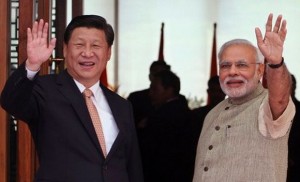India’s trade deficit with China widened alarmingly to $51.86 billion with a bilateral trade of $71.22 billion in 2015, apparently indicating that the burgeoning economic relations may become increasingly untenable in near future, if the steps are not taken in the right direction. In 2015, India’s exports to China stood at $9.68 billion whereas as imports were around $61.54 billion.
Clearly, the two Asian giants are trying to boost bilateral trade, but the ballooning trade deficit could make it unviable for India to continue on this path for long. Even during Prime Minister Narendra Modi’s China visit in 2015, no breakthrough was made on bridging the trade gap except declarations of intent by China’s leadership. However, both sides agreed to set up a task force to address trade deficit and market access issues.
The overall trade between these two nations already missed the deadline of $100 billion trade set by the leaders of the two countries. Following the widening trade deficit, India is pressing China to invest in its ‘Make in India’ and other projects.
Why India’s iron ore exports are falling?
Recently, India’s mining industry has been “adversely affected” due to a sharp drop in iron ore prices in the international market. The higher duty on iron ore led to India’s exports nosediving to just 6.12 mt in 2014-15 from 117.3 mt in 2009-10. However, the present government is mulling over the steel ministry’s proposal to reduce duty on higher grade iron ore exports. On the other side, China claims that India’s iron ore supply is not very stable and Chinese companies are looking for alternatives. The share of India’s iron ore export to China came down from 20% in 2008 to less than 0.5% in 2014.
“Increasing trade deficit with China can primarily be attributed to the fact that Chinese exports to India rely strongly on manufactured items meeting the demand of fast-expanding sectors like telecom and power while India’s exports to China are characterised by primary products, raw material and intermediate products,” India’s Commerce and Industry Minister Nirmala Sitharaman told parliament on March 14.
At present, Indian small and medium enterprises are facing stiff competition from Chinese imports. “In respect of 12 major product groups largely manufactured by MSMEs, imports from China grew at a higher rate than respective imports from all other countries combined during 2011-2 to 2014-15,” Ms Sitharaman added.
There are 322 anti-dumping cases in India, and China is involved in 177 cases. Ms Sitharaman has said that in order to boost exports and maintain balance of trade with China, India has impressed upon China to recognise the need for reduction in trade imbalance for a long term, sustainable and harmonious development of economic cooperation between the two countries.
India has been pushing China for enhanced access for pharma and IT products, but without much success. The movement on this long-pending issue is crucial to bridging trade deficit.
Author Profile
- India Writes Network (www.indiawrites.org) is an emerging think tank and a media-publishing company focused on international affairs & the India Story. Centre for Global India Insights is the research arm of India Writes Network. To subscribe to India and the World, write to editor@indiawrites.org. A venture of TGII Media Private Limited, a leading media, publishing and consultancy company, IWN has carved a niche for balanced and exhaustive reporting and analysis of international affairs. Eminent personalities, politicians, diplomats, authors, strategy gurus and news-makers have contributed to India Writes Network, as also “India and the World,” a magazine focused on global affairs.
Latest entries
 DiplomacyJanuary 5, 2026India walks diplomatic tightrope over US operation in Venezuela
DiplomacyJanuary 5, 2026India walks diplomatic tightrope over US operation in Venezuela India and the WorldNovember 26, 2025G20@20: Africa’s Moment – The Once and Future World Order
India and the WorldNovember 26, 2025G20@20: Africa’s Moment – The Once and Future World Order DiplomacyOctober 4, 2025UNGA Resolution 2758 Must Not Be Distorted, One-China Principle Brooks No Challenge
DiplomacyOctober 4, 2025UNGA Resolution 2758 Must Not Be Distorted, One-China Principle Brooks No Challenge India and the WorldJuly 26, 2025MPs, diplomats laud Operation Sindoor, call for national unity to combat Pakistan-sponsored terror
India and the WorldJuly 26, 2025MPs, diplomats laud Operation Sindoor, call for national unity to combat Pakistan-sponsored terror








